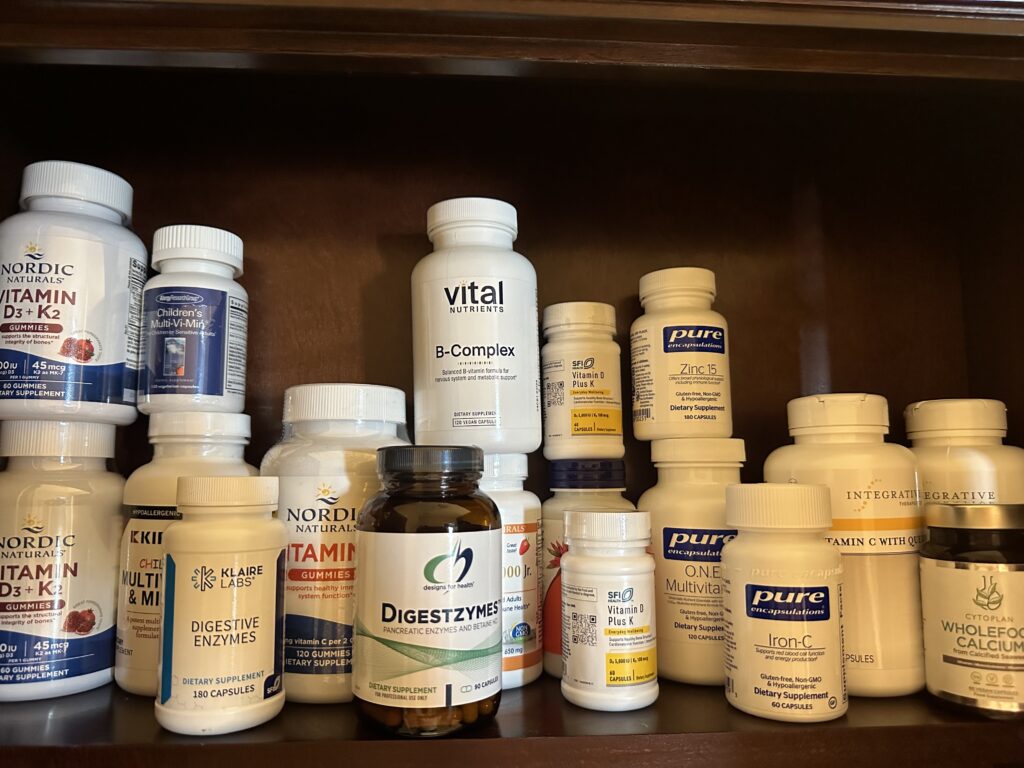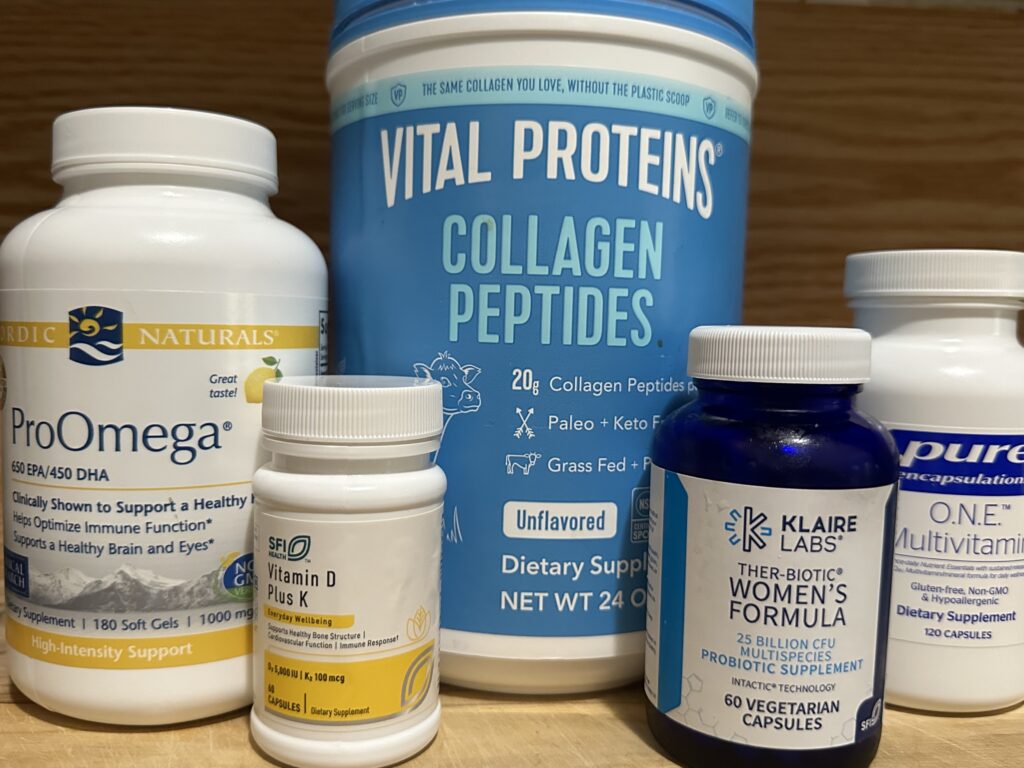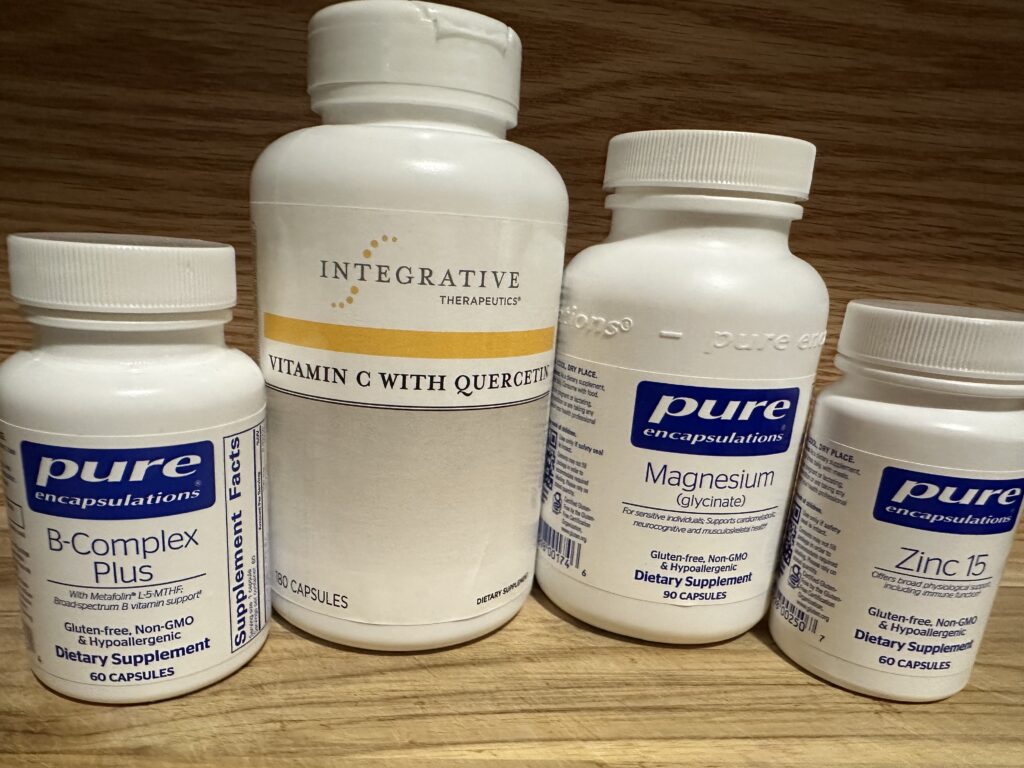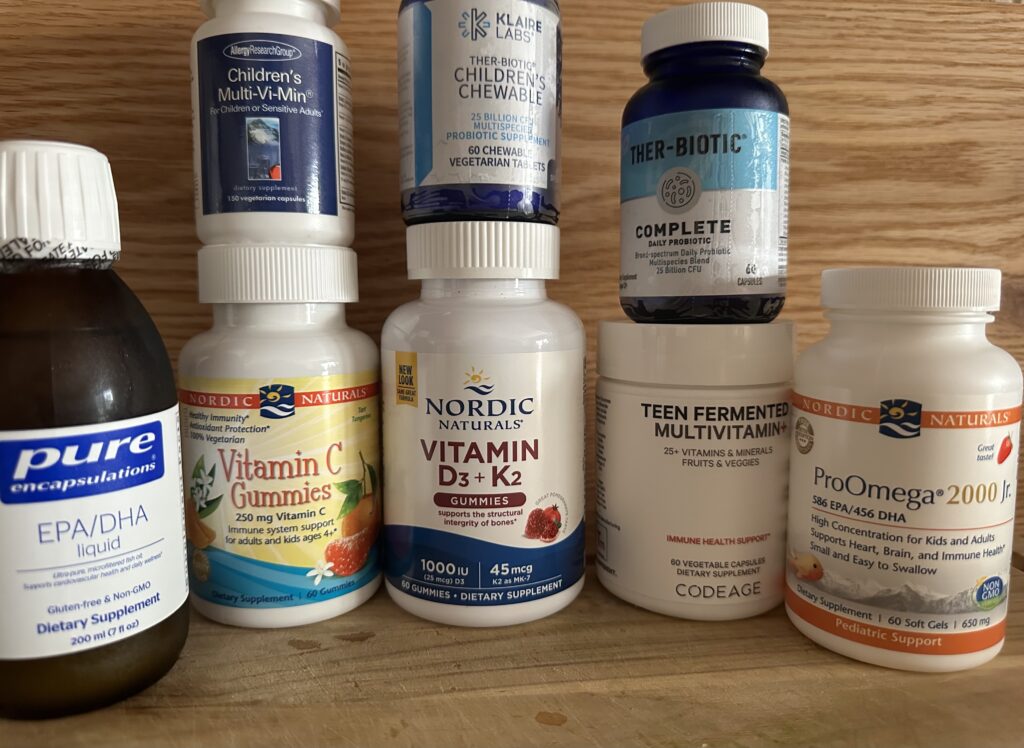Supplement options are seemingly limitless, and with all the choices inundating you on the shelves of your local pharmacy or health food store, picking the right supplement might feel intimidating and overwhelming. Maybe you’re wondering which options are best for you or asking yourself if supplements are even worth the price. Without knowing you and your goals with supplementation, I can’t tell you which options are the best for you, but I can share with you my rationale for how I, as a dietitian, decide which supplements are right for me and my family, and which supplements I think should be an essential part of most people’s wellness regimen. But first my dietitian heart needs to preface it with this: Whole food is better than supplementation. Real food contains groups of nutrients that work synergistically, making it superior to manufactured supplements. If you are choosing a supplement to replace real food in your diet, for example powdered greens to replace vegetables, I urge you to consider methods to increase your nutrient intake from whole foods rather than depending on supplements to provide nutrients. Allow supplements to be what they are meant to be, supplementation to a healthy diet. A means to fill in any gaps that may exist in your nutrient intake, but always aim first to get your full nutrient quota from real food.

How To Decide If You Need A Multivitamin
Single vitamins, multivitamins, minerals, probiotics, protein powders, amino acids, adaptogens, fish oils, and so on, there’s no shortage of options, and clever marketing may lead you to believe that the secret to health lies on one of those pharmacy shelves. You may wonder, do I even need to take supplements? Do any of them work? Are they the missing piece to my health journey? Are they safe? Let’s start with the basic multivitamin. Should you be taking a daily multivitamin?
My opinion, as a dietitian is. . . .YES. You need a multivitamin!
In theory, if you’re eating a balanced plate, and getting enough servings of fruits, veggies, whole grains, etc., then you shouldn’t need a multivitamin. BUT. . . none of us eat a perfect diet, so you can see how it’s possible that your diet doesn’t supply an optimal amount of every single vitamin and mineral. Our micronutrient (vitamins and minerals) levels could be suboptimal without any major symptoms of deficiency. But, how do you know if your vitamin and mineral levels are suboptimal? Unless you invest in a micronutrient test, there’s really no concrete way to identify potential deficiencies or suboptimal levels until you have major symptoms. I recommend talking to your doctor or healthcare provider about running simple blood tests to identify common deficiencies or if you have the means, you can invest in more comprehensive micronutrient testing that checks levels not only of each vitamin and mineral, but also omega fats, antioxidants, amino acids, and metabolites.
Often, I recommend a multivitamin just to cover your bases, especially if you have any conditions like:
- Thyroid disease
- Autoimmune disease
- Pregnancy
- Gut disorders or inflammatory bowel disease
- Vegan or restrictive diet
- Chronic fatigue
- Alcoholism
When you take a multivitamin your body absorbs what it needs and excretes most of the excess. For example, water soluble nutrients like B or C vitamins are easily excreted in urine. Fat soluble vitamins like A, D, E and K, however, are not as easily excreted, so it’s important to make sure that you’re not taking mega doses that exceed the Tolerable Upper Limit for that specific micronutrient. If you have any specific health issues or are taking medications, you should absolutely consult with a doctor or dietitian before starting any multivitamin or supplement regimen as some supplements are contraindicated with various conditions or medications
What To Look For In A Multivitamin
When selecting a multivitamin, look for a supplement that is :
- Broad spectrum- the supplement supplies most vitamins and minerals rather than just one or a few.
- Supplies at least the Recommended Dietary Allowance (RDA) for most of the micronutrients and doesn’t exceed the Tolerable Upper Limit (UL). The RDA and UL are two examples of Dietary Reference Intake (DRI) values. A doctor or dietitian can help you figure out what therapeutic dose is right for you.
- Third-party verified- Supplements do not have to be proven safe before being sold, so I recommend selecting supplements that have been tested and verified by a third party ensuring the contents of the actual supplement are the same as what’s on the label. More on third party testing later in this post.
- Bioavailability– Bioavailability refers to how easily your body can absorb and utilize a nutrient. Some forms of vitamins and minerals are more bioavailable than others. Here are a few examples of formulations to look for.
- Minerals are generally best absorbed as a mineral chelate like zinc picolinate, magnesium glycinate, or manganese citrate. Mineral oxides are poorly absorbed so steer clear of a supplement with a formulation that includes mineral oxides like zinc oxide (I’m talking about supplements only, zinc oxide as a sunscreen is ok!)
- Vitamin D is best absorbed as cholecalciferol
- Vitamin B12 as methylcobalamin but not cyanocobalamin
Picking a multivitamin may seem complicated but if you purchase from a reputable company, they’ve often created doses that fall within recommended DRI’s for the general population and will likely meet your needs. Nonetheless, you should check with your healthcare provider before starting a new supplement.
Other Important Supplements To Include In Your Health Regimen
A multivitamin isn’t the only supplement you should include in your wellness regimen. I recommend that most people also include vitamin D, Omega-3, and a probiotic.
The ideal supplement regimen is unique to you. A dietitian can help you identify gaps in your diet and recommend specific supplements to promote optimal wellness. But remember, food first, supplements second.

Vitamin D with K2
I recommend a vitamin D supplement in addition to a multivitamin for many of my clients, especially during the winter months. Vitamin D is important for regulating the absorption of calcium and phosphorus, modulating your body’s inflammatory and immune response, and protecting healthy gut bacteria. Our bodies are able to synthesize vitamin D in skin cells with exposure to sunlight (that’s why vitamin D is called the sunshine vitamin!), and we can obtain vitamin D from foods including fortified milk, fatty fish, egg yolks, cheese and mushrooms. Yet many people have suboptimal vitamin D levels. Like I mentioned before, you can ask your doctor for a simple blood test to check your vitamin D status. Vitamin D is a fat soluble vitamin so it’s important that you avoid taking too much as your body can not excrete excess vitamin D as easily as you can a water soluble vitamin. Most people benefit from supplementing with 1000 IUs in the summer when they are exposed to sufficient sun and 2000 IUs in the winter when sunlight exposure is less. Your doctor or dietitian can recommend how much vitamin D is right for you.
Omega-3 Fish Oil
I recommend fish oil supplements of at least 2000 mg per day to most of my clients because of the powerful anti-inflammatory effects of Omega-3’s. We all deal with chronic inflammation to some degree. Inflammation can be triggered by stress, lack of quality sleep, sugar intake, alcohol, poor diet, etc. so I tend to recommend fish oil supplements for extra anti-inflammatory support. In addition, fish oil supports eye, heart, and brain health. Of course, while obtaining the majority of your omegas through real food like fatty fish (salmon, mackerel, etc.) is preferable, supplementing to fill in gaps with a good quality fish oil can be beneficial. Omega-3’s are found in cold water fish like salmon, mackerel, sardines, and also in plant-based foods like chia seeds, flax seeds walnuts and hemp seed.
There are some who should avoid or use caution when taking a fish oil supplement- anyone taking blood thinners and nonsteroidal anti-inflammatory medications (aspirin, ibuprofen) should absolutely discuss the safety of taking fish oil with their doctor or dietitian. Also, people with certain conditions like A-fib should avoid the use of fish oil supplements. Again, it’s always wise to double check with your doctor or dietitian before starting a new supplement.

Probiotics
The final supplement I recommend is a probiotic to promote gut, immune system, and brain health. Probiotics are living microbes that provide a health benefit when taken in high enough doses and their importance to our overall health has recently become more apparent. Research shows that consuming probiotics either through fermented foods like yogurt, kefir, kimchi, sauerkraut (not shelf-stable kraut), and miso or through supplementation supports a number of positive health outcomes from reducing irritable bowel flare-ups to decreasing anxiety or other mental health illnesses. For a probiotic to be effective, the food or supplement should include multiple strains of Bifidobacterium, Lactobaccilus, and sometimes additional species, and have a high enough Colony Forming Unit (CFU) count, often 10 billion CFU’s or more. Different strains have different uses and different therapeutic doses; a strain that is used to decrease acute diarrhea is not necessarily the same strain used for supporting the immune response which is still different from strains used to reduce constipation. Choosing the best probiotic for you is dependent on what you are hoping the probiotic will do for you, and before selecting a probiotic, you should talk to your doctor or dietitian to make sure your probiotic supplement will meet your needs.

How To Choose A High Quality Supplement
The supplement industry does not have the same regulatory criteria as the prescription drug industry, and the FDA does not have to approve a supplement as safe before it’s marketed and sold to consumers. Instead, the company itself is responsible for the safety of its product and for truthfulness on the label. Unless the supplement company has paid for third party testing, there is no guarantee that what is on the label is actually what’s in the supplement, we’re just taking the company’s word.
That’s scary, right?
It leaves me wondering what type of cheap fillers could be used or if the active ingredients are as potent as the label claims. This is true not only for multivitamins, but also for any and all supplements. That’s why sticking with brands that have a good reputation for reliability and/or are third party tested matters and is often worth the extra investment.
THIRD-PARTY VERIFICATION
If a supplement has been vetted by a third party, the bottle or container will have a third-party verification seal on it. These are some common third party seals you might see:
- National Sanitation Foundation (NSF) https://www.nsf.org/consumer-resources/articles/supplement-vitamin-certification
The NSF certifies that what is stated to be in the supplement is in fact accurate and also certifies that there are not any ingredients/fillers in the supplement that are not disclosed on the package.
- United States Pharmacopeia (USP) https://www.usp.org/verification-services/verified-mark
The USP certifies that the label accurately reflects ingredients contained in the supplement in both content and potency, that there are not toxic levels of specified contaminants, and that the manufacturer follows sanitary practices and ensures quality control between batches.
It’s important to note that these third party testers do not ensure that the product will work for your intended purpose, just that the package label accurately reflects what is in the supplement. If you see another certification, take time to research what that certification means and make sure it’s legit. Some “certifications” are placed on a bottle as a marketing tactic and mean absolutely nothing and are misleading.
Dietitian's Personal Supplement Regimen
I’ll share my supplement regimen, not because I think you should take the exact same supplements, but only because so many ask. Everyone should have their own personalized supplementation plan that meets their unique needs.
What I take daily:
- Multivitamin: O.N.E. Multivitamin by Pure Encapsulations
- Vitamin D: Vitamin D Plus K by SFI health **I take a high dose even in the summer because I am chronically suboptimal in Vitamin D.
- Omega supplement: ProOmega by Nordic Naturals. These capsules are large, but this brand also caries ProOmega Jr in a capsule that is smaller and easier to swallow. They also carry a liquid omega supplement.
- Probiotic: Ther-Biotic Women’s Formula by Klaire Labs
- Collagen Peptides: 2 scoops in my coffee to boost my protein. My mornings are often hectic with little time for snacking, and this extra bit of protein helps me make it to lunch without feeling overly hungry. I prefer the unflavored version in my coffee, but the chocolate version is delicious in banana smoothies.

What I take on an as needed basis:
For immune support I take a combination of all my normal supplements plus
- Vitamin C with Quercetin 2 to 3 times per day
- B- Complex Plus 2 to 3 times per day
- Zinc 2 to 3 times per day

My kids and husband follow a similar supplement regimen taking a multivitamin, probiotic, vitamin D, and fish oil daily with other immune support supplements as needed.

I order supplements through an online dispensary called Fullscript. Supplements available through Fullscript are professional-grade and have been vetted by Fullscript’s medical advisory team ensuring quality control so I know that I am taking high-quality supplements that have been tested for purity, potency and safety. As an added perk, the supplements ship to my house and after creating an account, supplement orders are saved so that reordering is a breeze.
I don’t recommend ordering supplements from Amazon, but if you do, ensure they’re from the brand’s official Amazon store and shipped directly by them to avoid counterfeits.
If you’ve decided that high quality supplements are a must in you and your family’s wellness routine, check out my online dispensary on Fullscript to order professional-grade supplements at a discount.
*These statements have not been evaluated by the Food and Drug Administration. These products are not intended to diagnose, treat, cure or prevent any disease.
